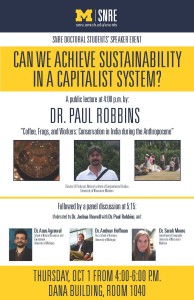A new paper by Sara Meerow, John Nordgren, and Missy Stults in Environmental Science and Policy assesses existing resources and efforts for climate change adaptation and the needs of local communities. The paper suggests that more work is needed for local communities and their practitioners to respond to climate change. Additionally, the paper suggests that climate adaptation resources and services need to be streamlined and organized to ensure efficacy and efficiency. Read the article here.
Category Archives: News
Sara Meerow receives three research awards
Sara Meerow was recently awarded a Rackham Predoctoral Fellowship, the Menakka and Essel Bailey Fellowship, and first place in the AAG Human Dimensions of Global Change Specialty Group Student Research Competition.
The Rackham Predoctoral Fellowship supports outstanding doctoral students in their last year working on dissertations that are unusually creative, ambitious and risk-taking.
The Menakka and Essel Bailey Fellowship is awarded to graduate students pursuing research, field work, cultural experience, or other study relevant to their graduate degree, preferably in the areas of public health, health care, or environmental work in South or Southeast Asia (excluding China or Japan).
The American Association of Geographers Human Dimensions of Global Change Specialty Group Student Research Competition provides an annual award to support graduate research in the area of human dimensions of global change.
White Paper from FEWS Urban Agriculture Workshop
“Scaling Up Agriculture in City-Regions to Mitigate FEW System Impacts” produced from the October 2015 NSF-Funded Workshop “FEW Workshop: ‘Scaling Up’ Urban Agriculture to Mitigate Food-Energy-Water Impacts” held at the University of Michigan- Ann Arbor assesses urban agriculture and its relationships with energy, water, food access, and other issues. This white paper summarizes current knowledge with respect to urban agriculture, evaluates integrative frameworks and modeling approaches to assess urban FEW system interactions, and identifies crucial research needs to transition urban FEW systems towards integration, sustainability, resiliency, and equity. Read the white paper here.
Paper on urban resilience selected as Editors’ Choice by Landscape and Urban Planning
Paper by Sara Meerow, Joshua Newell, and Melissa Stults in Landscape and Urban Planning reviews the existing literature on urban resilience and proposes a new, inclusive definition. Read the article here.
?????? ?? blacksprut com – ??????? ?? ????????? ???????????
New USRG publication on defining urban resilience
A new paper by Sara Meerow, Joshua Newell, and Melissa Stults in Landscape and Urban Planning reviews the existing literature on urban resilience and proposes a new, inclusive definition. Read the article here.

